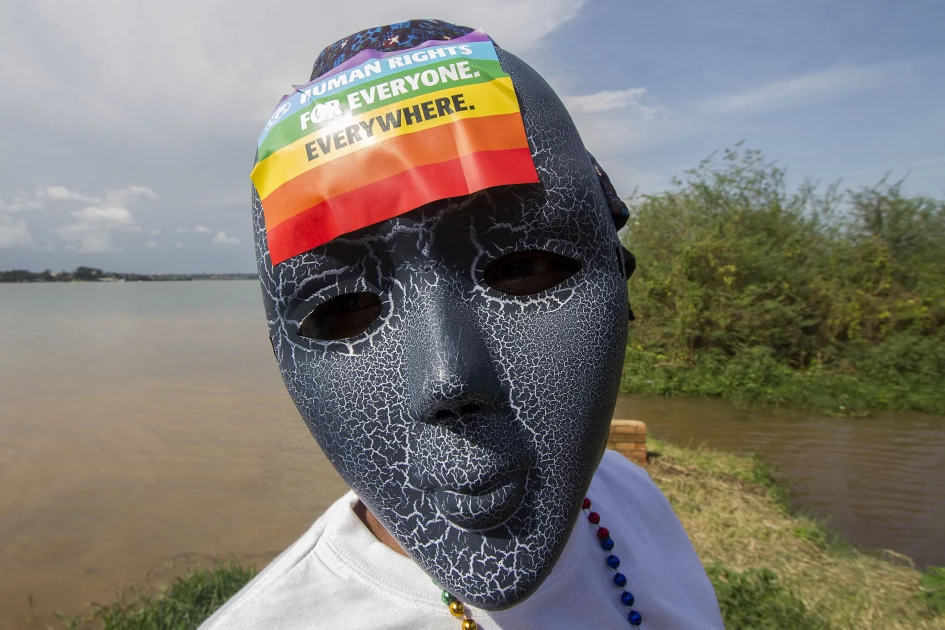Uganda court throws out challenge to harsh anti-gay law

A Ugandan wearing a mask with a rainbow sticker takes part in the Gay Pride parade in Entebbe on August 8, 2015. Ugandan activists gathered for a gay pride rally, celebrating one year since the overturning of a strict anti-homosexuality law but fearing more tough legislation may be on its way. Homosexuality remains illegal in Uganda, punishable by a jail sentence. Uganda's Constitutional Court on April 3, 2024 rejected a bid to overturn to a controversial anti-gay law that is considered one of the toughest in the world. (Photo by AFP)

Audio By Vocalize
The legislation was adopted in May last year, triggering outrage among the LGBTQ community, rights campaigners, the United Nations and Western powers.
It imposes penalties of up to life in prison for consensual same-sex relations and contains provisions that make "aggravated homosexuality" an offence punishable by death.
"We decline to nullify the Anti-Homosexuality Act 2023 in its entirety, neither will we grant a permanent injunction against its enforcement," Richard Buteera, Uganda's deputy chief justice and head of the court, said in the landmark ruling.
The decision was greeted with dismay by opponents of the law, although the five-judge bench did strike out several provisions it said were inconsistent with international rights conventions.
These included provisions making it an offence to fail to report homosexual acts, to lease premises for such acts, or if someone engaging in homosexual sex led the other to contract a terminal illness.
But "the upshot of our judgement is that this petition substantially fails", Buteera said.
At the United Nations in Geneva, Human Rights Commissioner Volker Turk again urged Kampala to repeal the law "in its entirety, together with other discriminatory legislation".
"Criminalization of and application of the death penalty to consensual same-sex relations are contrary to Uganda’s international human rights treaty obligations," Turk noted.
Amnesty International expressed similar dismay, saying the court "turned its back on its responsibility to fully uphold Uganda's Constitution".
"It is shocking that an opportunity was missed to revoke," what Amnesty called a "callous" law.
The ruling comes amid an anti-gay crackdown by governments in East Africa, which has a history of repression against gay people, often encouraged by conservative Muslims and Christians.
- 'Public bigotry' -
Nicholas Opiyo, the lawyer representing the petitioners, said they disagreed with the ruling, but will study it fully before deciding on the next steps.
"You come to court expecting it to rise above public bigotry and sentiments. To that extent, it is a letdown," he posted on X.
The petition was brought by two law professors, legislators from the ruling party and human rights activists.
They had charged that the legislation violated fundamental rights guaranteed by Uganda's constitution, including freedom from discrimination and the right to privacy.
The petitioners also said it contravened Uganda's commitments under international human rights law, including the United Nations convention against torture.
MP Fox Odoi-Oywelowo, a member of President Yoweri Museveni's National Resistance Movement who spoke out against the law, told AFP the decision "was expected".
"But the law is a bad one for the country and should have been struck down long ago."
Oryem Nyeko, researcher at Human Rights Watch, said the decision was "disappointing and a missed opportunity in regard to safeguarding fundamental human rights".
- 'Negative foreign influence' -
But Uganda's parliament speaker Anita Among hailed the ruling. "This is a big achievement for Uganda," she told AFP.
"The ruling proves that all arms of government, the parliament, the executive and the judiciary have one common goal of protecting Uganda against negative foreign influence."
Museveni's government has struck a defiant tone, with officials accusing the West of trying to pressure Africa into accepting homosexuality.
And the measures have enjoyed broad support in the conservative, predominantly Christian country.
Last August, a 20-year-old man became the first Ugandan to be charged with "aggravated homosexuality" under the contested law.
The United States, which threatened to cut aid and investment to Kampala, imposed visa bans on unnamed officials in December for abusing human rights, including those of the LGBTQ community.
The World Bank announced in August it was suspending new loans to Uganda over the law, which "fundamentally contradicts" the values espoused by the US-based lender.
In December, Ugandan state minister for foreign affairs Henry Okello Oryem accused the West of seeking "to coerce us into accepting same-sex relationships using aid and loans".
In 2014, international donors had slashed aid to Uganda after Museveni approved a bill that sought to impose life imprisonment for homosexual relations, which was later overturned.
Last month, a Ugandan court dismissed an appeal by a gay rights group seeking government registration, ruling that it aimed to promote "unlawful" activities.
The Court of Appeal said any registration of the group Sexual Minorities Uganda (SMUG) was against the public interest and national policy.


Leave a Comment